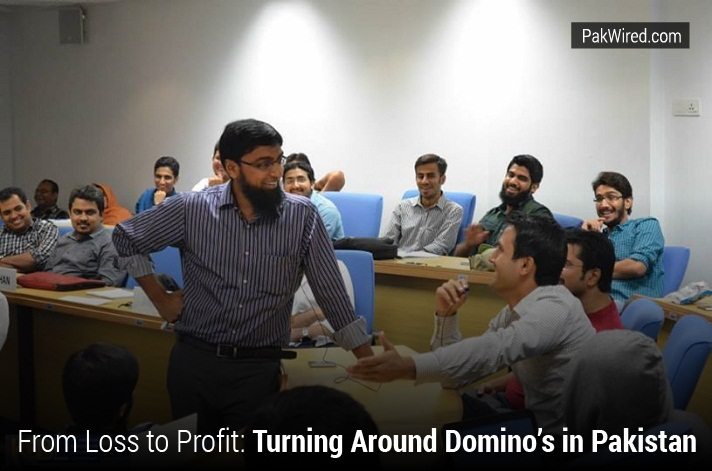It’s the classic story of supply meets demand. On the one hand, Domino’s was losing its grip and brand recall among Pakistani consumers. And on the other, Pizza Hut’s GM of Operations, Ahsan Ahmed, wanted to be the Jack Welch of retail industry.
In May 2012, he signed a 3 year deal and joined Domino’s as its CEO in Pakistan with the goal for helping the company achieve its first ever month of positive P&L in 9 years. Not only did he manage that, but also 70% growth over the previous year. The question is how.
What did this experience teach you?
Domino’s grew because talented people got together. I just stumbled to their presence.
What was wrong at the point you took over?
International brands use our people, facilities, ingredients, our brains – yet sell under their own brand – leaving a fraction of the income and take another fraction back. Domino’s was struggling for 9 years – no one knew who was running the company or growing it. We can easily create good concepts, have a lot of creative people that can create kick ass brands.
How do you identify talent with leadership potential?
Anyone who has to make a decision is a leader. At times, the rider is a leader. You reached the customers house and showed them the order and you realize the order is damaged. Rider has to make a call and say “Please have this and I will get you another one.”
But people don’t do this because brands are wary of employee theft.
Are you happy when the competition steals the customer? When you don’t change the product, you will lose the customer. If you haven’t put in a monitoring setup that prevents people from stealing, its the HQ’s fault. People in the head office don’t know what happens in the field. They have never filled the forms.
So how many riders are now at HQ, calling the shots?
A lot of decisions are being made by operators. They are strategic and tactical. Not 100%, but certainly a higher % than our competitors. Our goal is to fill every department with an operator. Food companies think that riders are replaceable. But the customer interacts with this so called lowest denominators.
Can local brand achieve similar success?
There is money to be made. I better be ready to take it. In Pakistan people eat out or order in at max 3 times a week. In Dubai, its at max 6 times a week. When Pakistan transitions to this, the market will explode. You better have that inverted triangle.
What sets a good operator apart from the rest?
I want a group of people who have handled (and retained) irate customers. Brands mistakenly send their weakest team member to handle irate customers when in fact the strongest must go and create a long lasting bond. Every complaint is a gift, its a great chance to connect with people.
How do you operate?
We introduced a system wherein hiring focused on operators with successful backgrounds. We taught them time and people management. We created a decision making unit. Its the group that runs business for Domino’s. They set the goals to chase. We hand them projects and P&L management. They make their own budgets and gain approvals by BCM (Budget Control Members) and me. Its made in the 3rd week of the month to prepare and execute.
Why the third week?
It leaves ample time for planning. In the fourth week, they need to translate this into KPI which is linked to the budget. In the first week of the month, you need to sit and review your people side – how strong is your bench? Are you covered for the growth that is anticipated? Also see customer complaints, who has to be trained, hired or fired. Only then will people side be strong.
In the second week, we sit and review the marketing plan. If things are working, what is working? This is where we decide what stays and what is removed. Then comes to process of budgeting for the next month. Its an easy four step approach for meeting financial goals.
Why not quarterly like the MNC’s do it?
The mantra of the food business is ‘expect the unexpected.’ If you set financial goals every quarter. you only get 90 days to reach it. With our monthly approach, you are giving 12 chances. If you can improve the planning process and make it simple. Our growth is 45-50% growth, index to last year, most of which is thanks to the teams own planning.
Doesn’t that set up the team for feeling overwhelmed with the targets?
You have to make sure you’re setting the right kinds of targets. Then break it down – baby steps – into small achievable steps. People wait for exit interviews to ask people why they’re leaving. People miss the budget because its the case of wishful thinking.
Why did you close the North Nazimabad outlet?
There is no way to predict problem child’s. What works today may not work tomorrow. Irrespective of whose brain child it was, if it hurts the P&L, you must shut the facility. We’re looking at a third facility for DHA, ideally in Phase 2 extension. In order to service Karachites in 30 minutes of less, you need 70 locations.
Is this turnaround an outlier?
Turnarounds are possible in Pakistan. Because we have a fantastic bunch of human resource. Anyone who says otherwise should look in the mirror. Domino’s was able to make a come-back because the customers were very forgiving. The key is that you fill the HQ with operators. And give them a simple mechanism to do their jobs. It Alhamdulillah worked in our case. If it can turnaround for Domino’s, then it can for anyone.
What would you like the future applicants of the QSR industry to know?
My boss from Pizza Hut used to say that every problem has two legs. I have learnt that every success has two legs too. The problem is that we find the problem legs and shoot them, and forget to recognize the legs doing a good job. I hire people for their body language. You can teach them QSR and customer service, you cannot teach body language. I’m going to hire people on their ability to handle politics. QSR industry aspirants should
- Have the decency to inform the customer if an order will be late.
- Remember that somewhere in the system, a boss does not care how you get the job done, but wants it done.
- Finding a coping mechanism to help them take stress positively.
Why do you think most people shy away from QSR?
High stakes players in the country are coming in for some economic interest. Making money legally is the easiest thing to do. If you are making a lot of money and someone’s wants a cut in an illegal manner, you can find a way to be proactive and find a way of co-existing.
You and I can’t change Pakistan overnight, but in the mean time, we have to be practical people. When a food authority seals a premises, its because impractical and idealistic people have rubbed them the wrong way. Look at the other side. Batha earnings are far less than what QSR’s steal in evading taxes. So when you don’t ethically feed the regulators, they will eventually strike back. Business owners are bigger thieves for tax non payment. They think of this as the chicken and egg problem. Fix the paradox, you have the brains and resources to ensure accountability and make public those that steal.
What’s your key advice for QSR industry CEO’s?
Don’t manage people, lead them. Managing people makes them unhappy. Unhappy people get your store closed.


